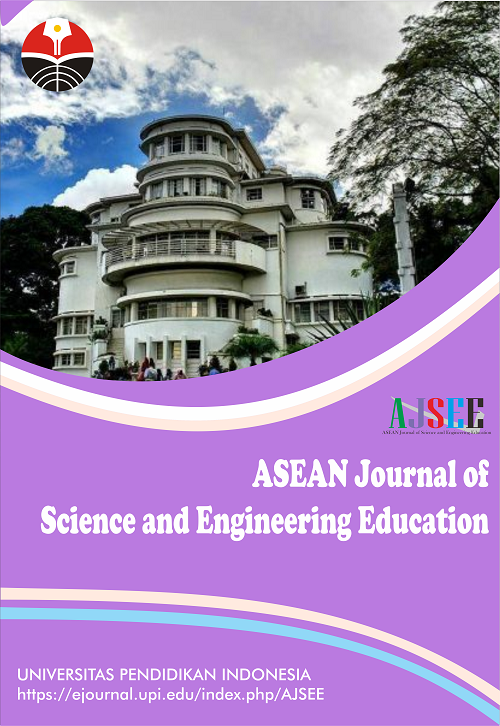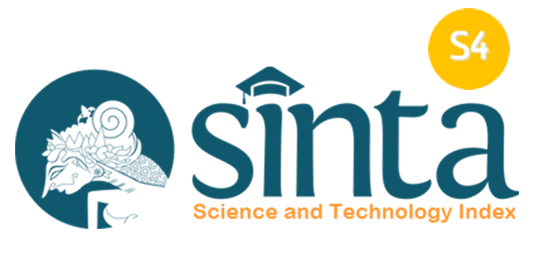Problem-Based Learning on Students' Attitude Towards Science: An Action Research
Abstract
Keywords
Full Text:
PDFReferences
Abd-El-Khalick, F., Summers, R., Said, Z., Wang, S., and Culbertson, M. (2015). Development and large-scale validation of an instrument to assess arabic-speaking students' attitudes toward science. International Journal of Science Education, 37(16), 2637–2663.
Ahmad. C. V. (2021). Causes of students’ reluctance to participate in classroom discussions. ASEAN Journal of Science and Engineering Education, 1(1), 47-62.
Akpinar, E., Yildiz, E., Tatar, N., and Ergin, Ö. (2009). Students' toward science and technology: An investigation of attitudes of gender, grade level, and academic achievement. Procedia-Social and Behavioral Sciences, 1(1), 2804–2808.
Amin, D. I., Sutrisno, D. S. (2018). Higher order oriented conceptual understanding assessment instrument thinking skills process skills and attitudes towards science in hydrocarbon and petroleum study materials. Journal of Education: Theory, Research, and Development, 3(9), 1142–1146.
Amin, S., Utaya, S., Bachri, S., Sumarmi, and Susilo, S. (2020). Effect of problem-based learning on critical thinking skills and environmental attitude. Journal for the Education of Gifted Young Scientists, 8(2), 743–755.
Ariyani, F., Maulina, H., and Nurulsari, N. (2019). Design and validation of inquiry-based STEM learning strategy as a powerful alternative solution to facilitate gifted students facing 21st century challenging. Journal for the Education of Gifted Young Scientists, 7(1), 33–56.
Barmby, P., Kind, P. M., and Jones, K. (2008). Examining changing attitudes in secondary school science. International Journal of Science Education, 30(8), 1075–1093.
Buck, G. A., Cook, K. L., Quigley, C. F., Prince, P., and Lucas, Y. (2014). Seeking to improve African American girls' attitudes toward science: A participatory action research project. The Elementary School Journal, 114(3), 431-453.
Cakici, Y., and Turkmen, N. (2013). An Investigation of the effect of project-based learning approach on children's achievement and attitude in science. The Online Journal of Science and Technology, 3(2), 9–17.
Ekamilasari, E., and Pursitasari, I. D. (2021). Students' critical thinking skills and sustainability awareness in science learning for implementation education for sustainable development. Indonesian Journal of Multidiciplinary Research, 1(1), 121-124.
Ekunola, G. T., Onojah, A. O., Talatu, A. F., and Bankole, M. O. (2022). Colleges of education lecturers’ attitude towards the use of virtual classrooms for instruction. Indonesian Journal of Multidiciplinary Research, 2(1), 187-194.
Feist, G. J. (2012). Predicting interest in and attitudes toward science from personality and need for cognition. Personality and Individual Differences, 52(7), 771–775.
Ferreira, M. M., and Trudel, A. R. (2012). The impact of problem-based learning (PBL) on student attitudes toward science, problem-solving skills, and a sense of community in the classroom. Journal Of Classroom Interaction, 47(1), 23-30.
Hacieminoglu, E. (2016). Elementary school students' attitude toward science and related variables. International Journal of Environmental and Science Education, 11(2), 35–52.
Hu, X., Leung, F. K. S., and Chen, G. (2018). School, family, and student factors behind student attitudes towards science: The case of Hong Kong fourth-graders. International Journal of Educational Research, 92, 135–144.
Kanyesigye, S., Uwamahoro, J., and Kemeza, I. (2022). Effect of problem-based learning on students' attitude towards learning physics: A cohort study. F1000Research, 11, 1-18.
Kind, P., Jones, K., and Barmby, P. (2007). Developing attitudes towards science measures. International Journal of Science Education, 29(7), 871–893.
Kurniawan, D. A., Astalini, A., Kurniawan, N., and Pathoni, H. (2019). Correlation analysis of students' attitudes and student discipline towards science in SMP students in Jambi Province. Journal of Physics and Science Education, 5(2), 59.
Kuvac, M., and Koc, I. (2019). The effect of problem-based learning on the environmental attitudes of pre-service science teachers. Educational Studies, 45(1), 72-94.
Lumbu-ani, J., Abusama, H. P., Pangarungan, J. L., Danozo, J. J. L., Estrada, M. J. L., Hasan, H. A., and Moscoso, L. H. A., (2021). Attitude of Sultan Kudarat State University laboratory high school students and teachers on proposed “no homework policy” bill. Indonesian Journal of Educational Research and Technology, 1(2), 45-50.
Mou, T. Y. (2023). Science learning with designed animation: Investigation of primary school children's attitudes toward science learning, animation integration, and understanding level. International Journal of Educational Research Open, 4, 1-11.
Sahin, D., and Yilmaz, R. M. (2020). The effect of augmented reality technology on middle school students' achievements and attitudes towards science education. Computers and Education, 144, 1-24.
Saiful, A., Utaya, S., Bachri, S., Sumarmi, S., and Susilo, S. (2020). Effect of problem-based learning on critical thinking skills and environmental attitude. Journal for the Education of Gifted Young Scientists, 8(2), 743-755.
Shah, S., S. (2022). A study on attitude of urban and rural college student teachers towards science. Indonesian Journal of Multidiciplinary Research, 2(2), 339-346.
Sombria, K. J. F., Celestial, D. L., Jalagat, C. G. M., and Valdez, A. G. (2023). Online learning through google classroom: Effects on students critical thinking skills in chemistry. ASEAN Journal of Science and Engineering Education, 3(2), 193-210.
Volet, S., Jones, C., and Vauras, M. (2019). Attitude-, group- and activity-related differences in the quality of pre-service teacher students' engagement in collaborative science learning. Learning and Individual Differences, 73, 79–91.
DOI: https://doi.org/10.17509/ajsee.v4i2.60400
Refbacks
- There are currently no refbacks.
Copyright (c) 2023 Universitas Pendidikan Indonesia

This work is licensed under a Creative Commons Attribution-ShareAlike 4.0 International License.













